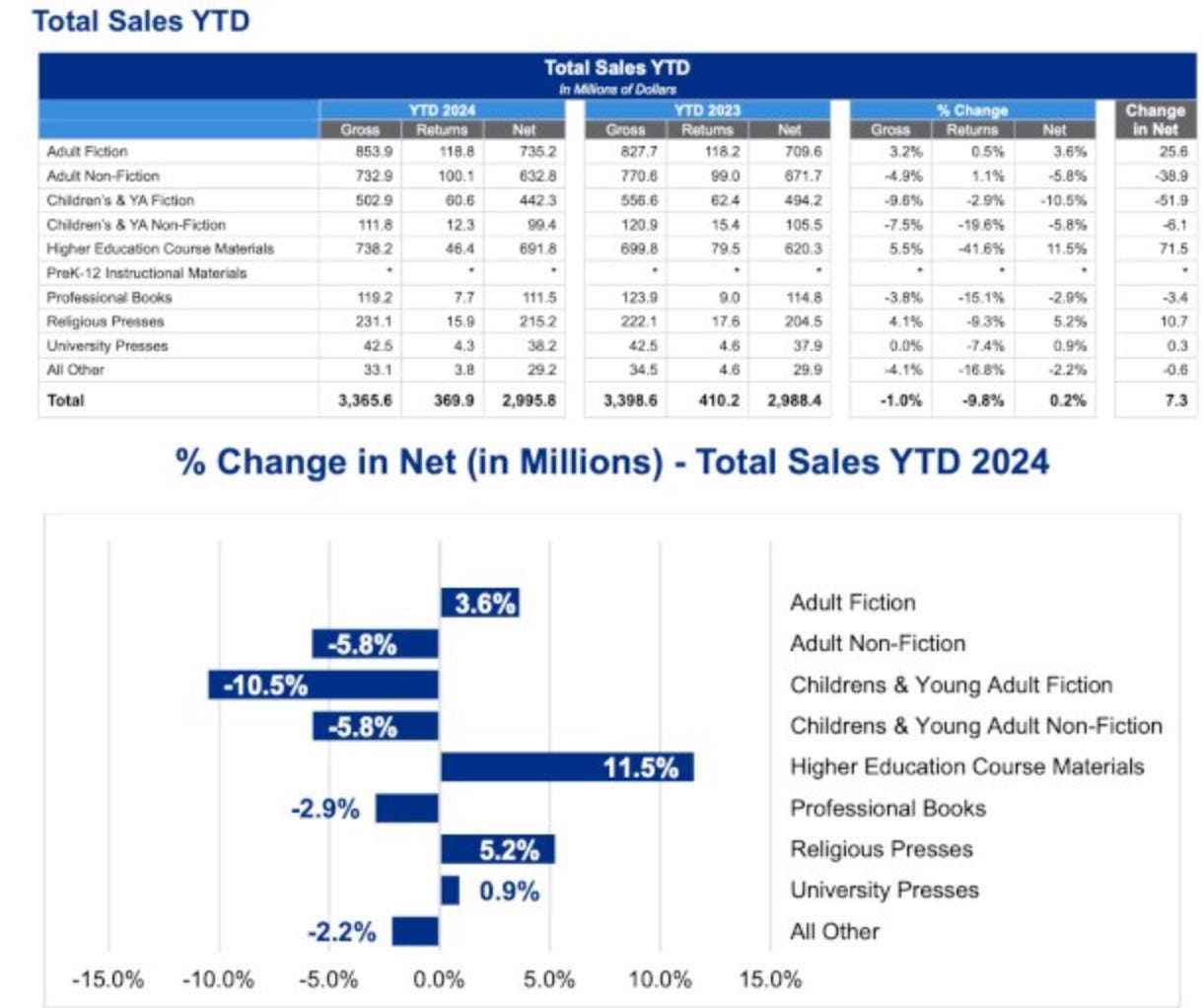What Do “Cost-Saving Measures” + Sales + Layoffs Mean in Book Publishing?
What Do “Cost-Saving Measures” + Sales + Layoffs Mean in Book Publishing? Book sales don’t tell the whole story of a publishing imprint.
The latest news from book publishing trades is a tale of two sides of the industry. On the positive side, Fiction sales are up, nonfiction is soft, audiobooks are hot, and Washington Square Press (an imprint of Atria Books/Simon & Schuster) is relaunching in 2025. On the negative side, nonfiction is soft, ebook sales are down, and Penguin Random House let go of two high-level executives: Reagan Arthur, Publisher at Knopf, and Lisa Lucas, Publisher at Pantheon and Schocken. Penguin Random House noted that restructuring the imprints (you can read the details here.) was “necessary for our future growth.”
Let’s unpack what all this means.
Book Sales
The charts below, 'Statshots' from the American Association of Publishers in Publishers Weekly this week, provide valuable insights. Adult fiction sales increased by 3.6%, a positive trend. However, it's crucial to delve deeper into the data to understand which books drive this surge. A small percentage of bestselling books and backlist titles are likely behind the fiction sales increase, indicating the importance of strategic promotion.
Nonfiction, which has remained soft over the past year, declined 5.8%. A quick scroll through TikTok and Instagram can provide some context for this decrease, highlighting the influence of social media on book sales and the need for innovative promotion strategies. If I am consuming content on TikTok that is equivalent to a memoir (like the woman who posted a 50-part series about her now ex-husband’s alleged fraud), why would I spend over $20 on a book? The same goes for cookbooks, self-help books, leadership books, etc. There is so much free information that a nonfiction book must be excellent to sell.
The most troubling data point is the declining sales of children’s and young adult fiction books. A 10.5% decrease is problematic; some can be blamed on…you guessed it! Social media. Data shows that kids have lagged in reading due to the pandemic and are not catching up. You can read about it here. A youth literacy problem in America means book sales will be affected. The public effort to ban countless books in various states is also to blame; if children don’t have access to books, how will they become comfortable reading?
Two bright spots are paperbacks and audiobooks. Audiobooks have been experiencing growth for at least a decade. Additionally, I see paperbacks becoming more prominent in the coming years due to the price point. It wouldn’t surprise me if hardcovers became deluxe editions within the next ten years.
Layoffs and “Cost-Saving Measures”
I’ve experienced layoffs and cost-saving measures. It never ceases to amaze me that other people suffer because of others' bad business decisions. Conversely, I’ve also seen what happens when an imprint that was once the darling of a publishing company becomes a problem to solve. This usually occurs when 1) A CEO departs, 2) A publisher departs, and 3) When the number crunchers can’t justify specific salaries. Either the publisher goes, the imprint is folded into another, or the new CEO cleans. It’s never about becoming more “nimble” or “realigning the business.” It’s more political, and most of us in the industry know that. The truth is not pretty. If a CEO departs, the publishers they hire are more likely to be under a microscope. If a publisher departs, editors and other staff they hired could be on the chopping block. It is less about cost-cutting and more about likability, alliances, etc. When things are good at an imprint, they are great. When they are bad, watch your back.
What we see now at Penguin Random House is still fallout from the failed merger with Simon & Schuster. The question is, are they too big to fail? The answer is not really. We may see imprints shut down or folded into others and more layoffs, but we will also see more books published. Do more with less has never been so magnified. Employees and authors deserve better. I don’t know what that is, but I think about it nonstop.
What I’m Watching: I binged Baby Reindeer over the weekend. Can we discuss this?
Where I’m Going: I’ll be covering Publishers Weekly’s Book Show on Wednesday as a media member. If you see me, say hi!
I will be a guest on the Bookum App LIVE this Friday at 11 am EST doing their Founders Talk Podcast. Download the app here and listen.
A Great Women’s Media Group Event: NPR's Ayesha Rascoe will discuss her new book, HBCU MADE: A Celebration of the Black College Experience, and her career journey, which has led her to host NPR's Weekend Edition Sunday. This virtual event will be held on Thursday, June 6, from 6-7 pm ET. It is $25 for members and $30 for non-members. The registration fee includes a copy of the book mailed to you! For more details and to register, click here.






Awesome as always. Thanks for jumping into this. Cost-saving measures seems like a euphemism for we overpaid to get these people. These two acquired big projects so they seem to be victims of their own big salaries. Appreciate what you say about alliances and likeability too. Would love to have the inside story.
This "cost-saving" also, of course bumped Lisa Lucas out of a job and she was/is one of the few high-powered women of color in the publishing business. And *that* is a truly appalling thing (not to mention that she was, at least from the writers' end of things, hella good at her job). Cost-saving in other industries seems also to mean that someone higher up made bad financial decisions but will not themselves suffer. Blergh.